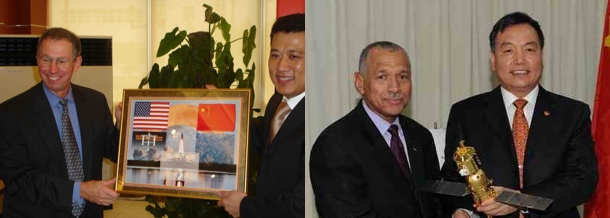Several leading American scientists recently learned their Chinese colleagues were denied access to the NASA Ames facility. The Kepler Science Conference is scheduled to be held at Ames in early November. NASA told Chinese applicants to the conference, and their U.S. sponsors, that federal legislation “forbids us from hosting any citizens of the People’s Republic of China at a conference held at facilities of the National Aeronautics and Space Administration. Regarding those who are already working at other institutions in the US, due to security issues resulting from recent Congressional actions, they are under the same constraints.”

Congressman Frank Wolf (R-VA) supported NASA Administrator Michael Griffen’s visit to China in 2006 (left). NASA Administrator Charles Bolden’s visit to China in 2010 (right) prompted Wolf to impose a congressional ban on official contact.
Today, federal law forbids NASA “to develop, design, plan, promulgate, implement, or execute a bilateral policy, program, order, or contract of any kind to participate, collaborate, or coordinate bilaterally in any way with China.”
Representative Frank Wolf (R-VA) inserted this sweeping language into a continuing resolution to fund the U.S. government in April 2011. Wolf chairs the commerce, justice and science subcommittee of the House appropriations committee, which funds NASA. His chief of staff said NASA Administrator Charles Bolden’s visit to China in October 2010 prompted his boss to impose the ban. Bolden neglected to consult with Wolf prior to his visit, as former administrator Michael Griffin did four years earlier (see photo). This upset the Virginia congressman, who is wary of any contact between NASA and its counterparts in China.
Wolf’s ban was the latest in long line of congressional attempts, extending over a period of more than twenty years, to regulate interaction between U.S. space professionals and their Chinese counterparts. The 1999 Cox Commission report put an end to commercial cooperation in space, including agreements to launch U.S. satellites on Chinese rockets. The 1989 Tiananmen Sanctions originally banned these launches, approved during the Reagan administration, but presidents Bush and Clinton both granted waivers to U.S. satellite manufacturers seeking to take advantage of available Chinese launch services.
Wolf believes all these restrictions, including his ban, are justified by concerns about Chinese human rights violations and the risks of technology transfer.
Two leading U.S. space scientists scheduled to participate in the Kepler Science Conference, Geoff Marcy, an astronomy professor at the University of California, Berkeley, and Debra Fischer, professor of astronomy at Yale University, decided to boycott the conference to protest NASA’s decision to deny invitiations to Chinese applicants. Marcy is reported to have called the ban on Chinese scientists “completely shameful and unethical.” Other international participants in the conference supported the call for a boycott if the Chinese were not admitted.
The controversy apparently proved embarrassing for Representative Wolf, who sent a lengthy letter to NASA Administrator Bolden blaming him for the problem.
“As you know, the congressional provision – which has been in place since early 2011 –primarily restricts bilateral, not multilateral, meetings and activities with the Communist Chinese government or Chinese-owned companies. It places no restrictions on activities involving individual Chinese nationals unless those nationals are acting as official representatives of the Chinese government. As such, the email from NASA Ames mischaracterizes the law and is inaccurate.”
Even before the ban, NASA scientists shied away from contact with their Chinese colleagues. One set of U.S. regulations states the “release of controlled technology to foreign persons in the U.S. are “deemed” to be an export to the person’s country or countries of nationality.” Another set of U.S. regulations defines many space-related technologies, including ideas, as “defense items” illegal to transfer to China. A casual conversation with a Chinese colleague at an international scientific conference could be legally construed as transferring secrets to the enemy.
Wolf’s legislation may contain the word “bilateral” but the history of restricted contact with China, the threat of legal penalties and the Congressman’s passion for the issue combine to create a chilling effect in the U.S. space science community that extends well beyond official bilateral exchanges with NASA. Professors in China are afraid to contact their students doing graduate work in U.S. universities for fear of subjecting them to criminal investigation. Visas for Chinese participants invited to international scientific conferences in the United States are routinely delayed or denied. Congressional threats to withdraw funding inhibit recipients of U.S. government funds from extending invitations to scientific gatherings to Chinese scholars because the U.S. government considers every Chinese national a representative of the Chinese government as a matter of law.
It should not be surprising that NASA officials decided to play it safe and avoid potential problems by denying Chinese scientists access to a conference held in a NASA facility.
In response to well-deserved criticism from the scientific community, Wolf allowed the Chinese to participate in this one conference. But rather than blaming NASA for misinterpreting his law, Representative Wolf should lift the broadly worded ban targeting Chinese scientists and allow NASA to fulfill its mandate—which includes engaging in international scientific cooperation— without having to fear congressional investigation, federal prosecution or additional professional embarrassment.
